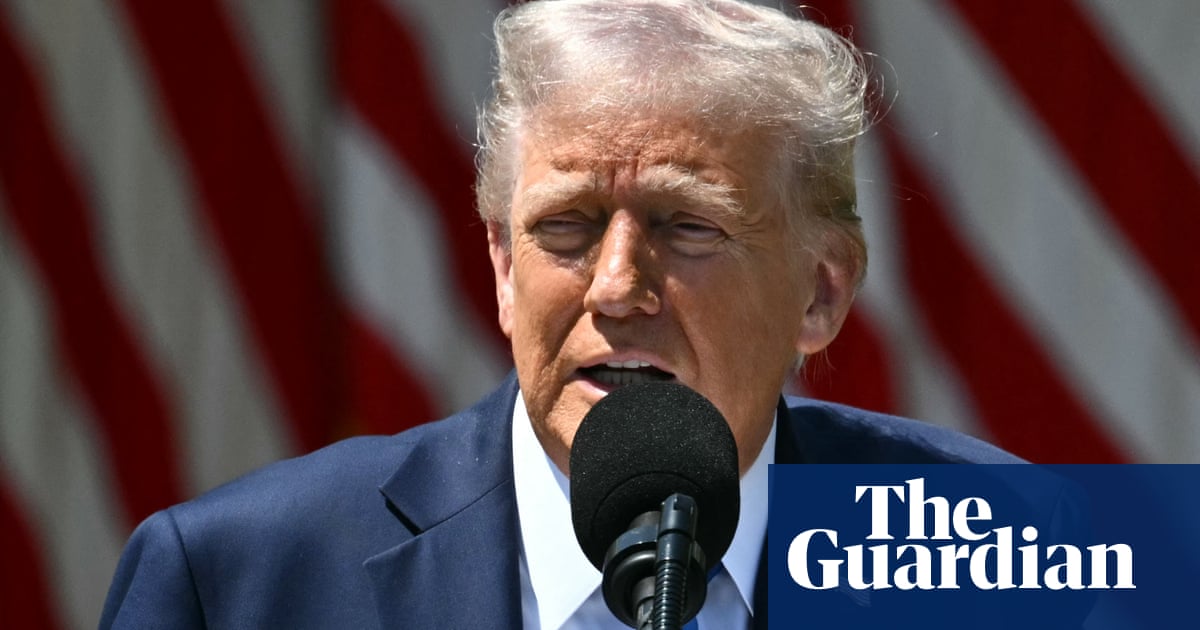The Trump administration will approve its first sale of military equipment to Ukraine since Donald Trump took office, in an indication that theminerals deal signed by the two countries this weekmay open a path to renewed weapons shipments.
The state department has certified a proposed licence to export “$50m or more” (£37.6m) of defence hardware and services toUkraine, according to a communication sent to the US committee on foreign relations. It would mark the first permission of its kind since Trump paused all Ukraine-related military aid shortly after taking office.
Ukraine’s president, Volodymyr Zelenskyy, said on Thursday evening that the signing of the long-discussed minerals deal – on much better terms for Ukraine than had previously been expected – was a result of the meeting he held with Trumpon the sidelines of the pope’s funeralon Saturday.
“Now we have the first result of the Vatican meeting, which makes it really historic. We are waiting for other results of the meeting,” he said, in his nightly video address.
Zelenskyy hailed the deal as “truly equal,” saying it created “an opportunity for quite significant investment in Ukraine”.
A senior aide saidKyivhoped that weapons deliveries would resume swiftly. “There is no direct link where it’s written that ‘you will receive these particular weapons’, but it opens the possibility for parallel talks on the purchase of weapons,” said Mykhailo Podolyak, an aide to Zelenskyy, during an interview in Kyiv. “The American side is now open to these discussions,” he added.
Ukraine’s first deputy prime minister, Yulia Svyrydenko, signed the agreement in Washington on Wednesday, along with the US treasury secretary, Scott Bessent. Senior US officials told reporters that they expected Ukraine’s parliament to ratify the deal within a week. The agreement will see a joint fund set up by the two countries, to be financed from new licenses to exploit deposits of critical minerals, oil and gas.
After several weeks when Trump appeared to be soft onRussiaand harsh towards Ukraine, authorities in Kyiv hope the dynamic may be changing. Zelenskyy said on Thursday the minerals agreement had “changed significantly during the process” and that it was “now a really equal agreement which allows for investment in Ukraine”.
Most notably, it excludes from its remit money previously sent to Ukraine as military and humanitarian aid, which Trump had repeatedly said he hoped to recoup. It also explicitly states that it should be implemented in a way that does not hamper Ukraine’s integration with the European Union and that US companies will not have a monopoly on deals in Ukraine, but merely obtain the right to take part in competitive bids on fair terms.
The final document followed almost three months of back-and-forth negotiation, after the first outline was brought to Kyiv by Bessent and rejected by Zelenskyy as far too punitive to sign. A later signing ceremony was planned at the White House in February, but broke down afterTrump and JD Vance turned on Zelenskyy in the Oval Office, prompting an abrupt conclusion of talks and the Ukrainian president being asked to leave.
Asked how Kyiv had been able to improve the terms of the minerals deal, Podolyak claimed that the actual discussions had proceeded in a very different tone to some of Trump’s public statements.
“That’s just the style of this [US] administration, it’s very aggressive with communications. They will allow leaks of the most horrible conditions and so on, but then in reality they negotiate normally and you can achieve a result,” he said. “They just use this aggression to try to improve their starting position,” he added.
Podolyak said that because US weapons supplied would now need to be bought, Kyiv would need to be more selective about what it requested from the US. “I think fairly quickly we will understand which types of weapons, to carefully select the unique weapons the US has. Because if we can produce our own drones, for example, then we will do that here. But there are some critical weapon types which only the US produces and nobody else,” he said.
Zelenskyy has previously expressed interest in spending tens of billions of dollars on purchasing Patriot air defence systems from the US, suggesting this could be done either through financing from European allies or through the planned minerals fund.
It was not immediately clear what weapons or services the more modest $50m now on the table referred to. The state department is required to notify Congress of significant sales of armaments and military services under the Arms Export Control Act.
Authorisation was sought for a direct commercial sale, which authorises the transfer of “defense articles or defense services made under a Department of State issued license by US industry directly to a foreign buyer”. The intended sale wasfirst reported by the Kyiv Post.
The last aid package to Ukraine came under the Biden administration, when Congress authorised $1bn in spending as the outgoing administration sought to fast-track military aid before Trump took office.
Russia’s reaction to the minerals deal has been muted, with the exception of the hawkish former president Dmitry Medvedev who claimed it was a disaster for Zelenskyy. “Trump has broken the Kyiv regime to the point where they will have to pay for US aid with mineral resources,” he wrote on Telegram. “Now they [Ukrainians] will have to pay for military supplies with the national wealth of a disappearing country.”
